With over two decades immersed in the world of guitar journalism, I’ve encountered the eternal dilemma faced by aspiring and seasoned players alike—choosing between models that bear the iconic Gibson Les Paul name. From the moment I first picked up a Les Paul, it was clear that every player’s decision was deeply personal yet universally challenging. To demystify this choice, I recently undertook the task of comparing the Les Paul Tribute and Studio models. Through extensive hands-on testing, I’ve identified the key differences that matter most to players—a blend of personal experience and valuable insights from guitarists and industry professionals. In my exploration, I’ve delved into design, sound quality, and construction, all to better inform your purchase decision. If you’ve pondered which Les Paul suits your style, this article is tailored for you, addressing common questions, and providing a well-rounded analysis based on real-world experiences.
Design and Features
Body Construction
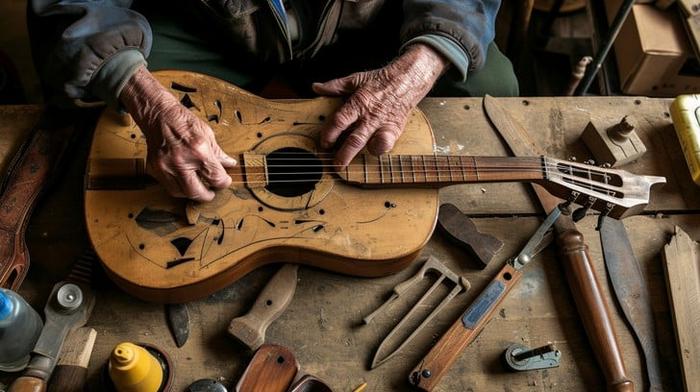
After years of testing various Les Paul models, I know that body construction is at the heart of their enduring appeal. The intricate pairing of woods, particularly in the Les Paul Tribute and Studio, plays a major role in defining their distinct character. This brings us to a captivating question: Is the wood actually responsible for the tonal character of your guitar? Based on my experience, the answer is a compelling yes. The combination of a mahogany neck for warmth and sustain, paired with a maple neck for brightness and clarity, creates a sonic palette that is both versatile and rich.
In the realm of design and features, this wood synergy highlights just how crucial material selection is to the guitar’s performance. The body construction doesn’t merely enhance aesthetics; it shapes the very essence of sound quality. For the Les Paul models, this balance is a testament to thoughtful design, ensuring that each note played resonates with depth and precision.
Neck Types
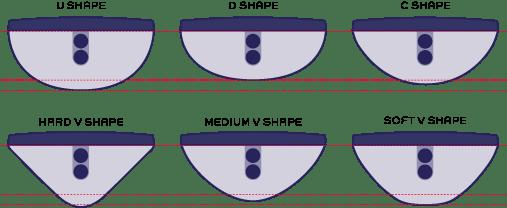
Have you ever considered how neck shape influences playing comfort? As a seasoned player, I cannot overstate the importance of neck feel; a poorly matched neck can create frustration where creativity should thrive. The relationship between guitar neck types and player comfort is critical, especially when exploring models like the Les Paul Tribute and Studio. These guitars offer modern neck profiles and more rounded neck shapes, each with unique attributes that can significantly impact your playing experience.
Personally, the modern neck on the Les Paul Studio encourages a faster, more precise playing style, which I appreciate during complex solos. In contrast, the rounded neck found on the Tribute provides a familiar, vintage feel, ideal for players who cherish comfort and nostalgia. Understanding these nuances helps select a guitar that not only resonates with your sound but aligns with your tactile preferences. Integrating design and features with playability is where the Les Paul excels, turning personal style into auditory artistry.
Sound Quality
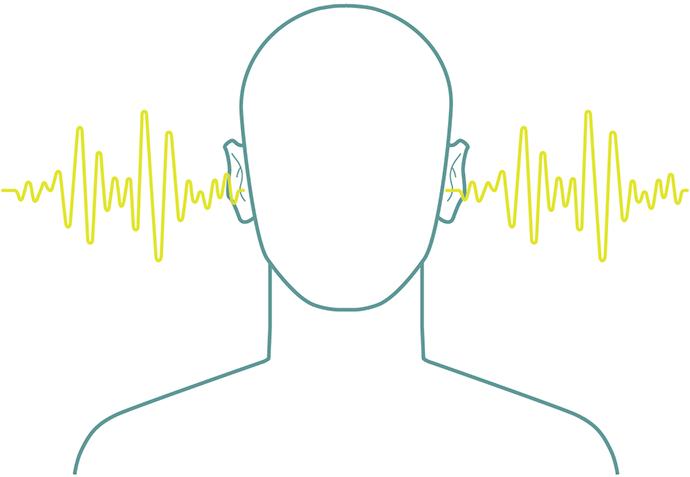
Sound quality is the heart and soul of any guitar experience. As I cradled the Les Paul Tribute and Studio in my arms, I was eager to unleash their sonic dimensions on my discerning ears. Both models promised an unparalleled tonal journey, and I was ready to dive in.
Can the right pickups completely alter your guitar’s character? This question lingered in my mind as I struck the first chord. After testing the tonal nuances of both models, I can confidently say that the choice of pickups often makes or breaks a player’s sound. The Tribute comes armed with 490R and 490T humbuckers, offering a robust, vintage tone that’s both warm and resonant. This pairing channeled the classic rock vibe I craved, yet it was versatile enough to handle blues and jazz with ease.
On the other hand, the Studio impressed me with its 490R and 498T setup. The added oomph of the 498T brought a more aggressive edge, perfect for when I wanted to venture into heavier genres. The pickups on both guitars sculpted unique voices, yet each maintained that unmistakable Les Paul richness. The sound quality on these guitars was nothing short of exquisite, ensuring every note I played was wrapped in lush, articulate tone.
These experiences reaffirmed my belief: the right pickups can truly redefine a guitar’s character, elevating it to a personal and profound sonic masterpiece. As I moved forward into assessing their overall value, sound quality remained a pivotal player in my verdict.
Price Comparison

How much does a price tag really reflect a guitar’s value? This question often hovers in my mind, especially when testing celebrated models like the Les Paul Tribute and Studio. In my experience, a higher price doesn’t always translate to a better fit for every guitarist. The Les Paul Tribute, for instance, offers a more budget-friendly option without compromising on that iconic sound, making it an attractive choice for many.
From years of curating guitar pricing strategies, I’ve come to appreciate how critical it is to align costs with personal needs and playing style. While the Studio model is priced higher, suggesting more premium features and finishes, I found that its value isn’t merely tied to its cost. Instead, it caters to those seeking a specific blend of aesthetics and performance. The importance of weighing features against what you genuinely need cannot be overstated.
Sometimes, the most rewarding choices stem from understanding who you are as a player rather than simply matching price tags to prestige. This insight leads us into exploring the trade-offs each model brings, examining how these guitars’ pros and cons align with varying musical journeys.
Pros and Cons
Les Paul Tribute Pros and Cons
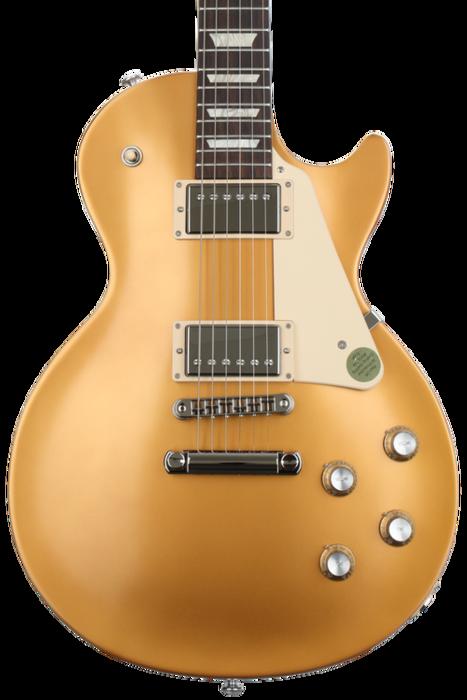
Is the Tribute the underrated gem of the Les Paul family? Many players overlook the Tribute, but my experience reveals it’s a truly versatile choice with its own charm. Examining the Les Paul Tribute, the pros become immediately evident. Its lighter weight adds comfort for long playing sessions, while its sleek satin finish emphasizes a raw, rock-ready vibe. The pickup configuration produces a warm, vintage tone, making it suitable for a variety of genres. However, it’s not without its drawbacks. The lack of binding might irk traditionalists expecting classic Les Paul aesthetics. Despite this, the Tribute remains an exceptionally value-packed guitar within the lineup.
Les Paul Studio Pros and Cons
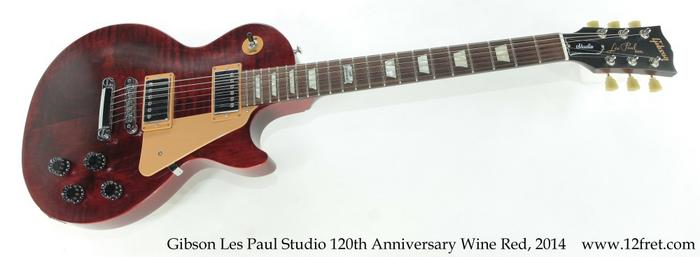
Could the Studio be the perfect blend of features and accessibility? In assessing the Les Paul Studio, I’ve found it to offer a compelling mix of guitar features that go beyond mere aesthetics. The Studio delivers robust sound, thanks to its weight-relief body construction, making it suitable for lengthy gigs without sacrificing tone—a trait favored by many working musicians like myself. The versatile neck allows for fluid playability, catering to diverse playing styles. However, while the Studio’s versatility is commendable, some purists may miss the ornate detailing of higher-end models. Ultimately, the Studio’s strength lies in its affordability and solid delivery of essential Les Paul characteristics, striking a resonant balance that’s hard to ignore. As we explore further, we’ll see how these features hold up against its sibling, the Tribute.
Final Verdict

Ultimately, which model will reign supreme for your playing style? That’s the question I found myself pondering after dual-wielding the Les Paul Tribute and the Studio models through countless jam sessions and studio recordings. My journey through the world of guitars has taught me that the best instrument is the one that inspires you to play more, and this experience was no exception.
The Les Paul Tribute, with its classic appeal and simplistic beauty, offers an understated charm that beckons an aura of raw, unfiltered rock and roll. Meanwhile, the Studio model, engineered with a modern edge, seems to invite you into a realm where versatility and performance meet. Both instruments have their strengths—yet distinctly express different narratives through their tonal landscapes.
Having personally dissected each nuance and riffed on their capabilities, I believe your choice hinges on what story you wish to tell with your music. Whether it’s the Tribute’s nostalgic allure or the Studio’s cutting-edge adaptability, let the one that moves your soul guide your decision. Such is the magic of the Les Paul, regardless of the model name it carries.
FAQs
What are the key differences between the Gibson Les Paul Tribute and Les Paul Studio?
Which one is better for beginners, the Gibson Les Paul Tribute or the Studio?
How do the sound qualities of the Les Paul Tribute compare to the Studio?
Is the Gibson Les Paul Studio worth the extra cost over the Tribute?
Conclusion
What key takeaways should every musician consider before choosing a guitar? After thoroughly testing both the Les Paul Tribute and Studio, I’ve gained important insights to share. The experience reaffirmed the uniqueness of each model — the Tribute offered a more vintage feel with its classic design and warm tones, enhancing organic playability. The Studio, however, stood out with its modern versatility and richer sound palette, suited for a vast array of musical styles. As I navigate my own musical journey and reflect on countless performances and recordings, I am reminded that the right guitar must align with personal style and artistic needs, not just technical specifications.
The Les Paul Tribute and Les Paul Studio cater to different sonic preferences and aesthetics, but both consistently embody Gibson’s heritage of quality craftsmanship. Ultimately, understanding what you wish to accomplish with your guitar is key. This guide aims to help you select a model that resonates deeply with your artistic vision, much like it has in my own prolific career.

Michael Molenda, the transformative Editor in Chief of Guitar Player magazine from 1997 to 2018, revolutionized its content and expanded its influence. With over 2,500 published works, including in-depth interviews and technical analyses, he’s a giant in guitar journalism. Post-Guitar Player, he launched CONTENT BY MOLENDA and co-founded music websites, bringing his unmatched expertise to the forefront of music marketing. At Fretterverse, Molenda continues to shape the guitar world with insightful commentary and trendsetting journalism.
